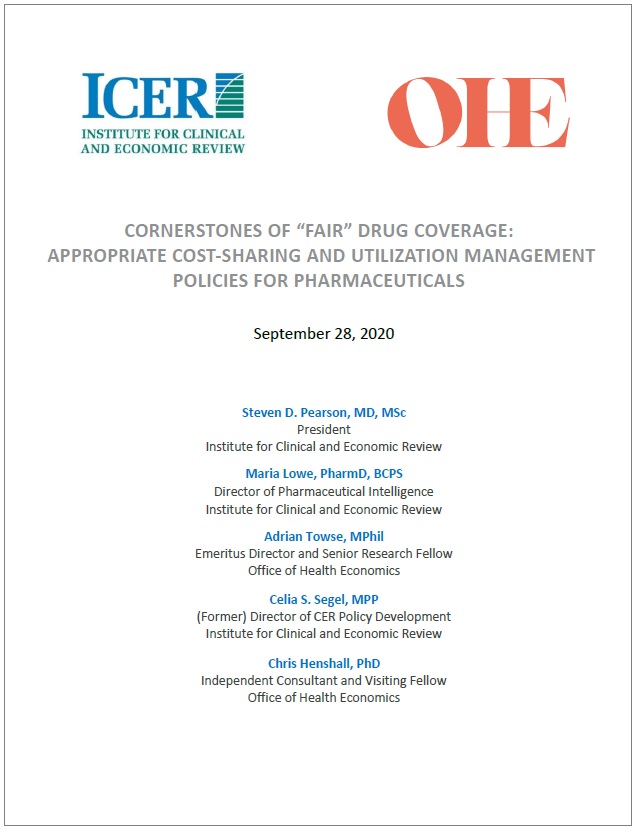Sign up to our newsletter Subscribe
Cornerstones of “Fair” Drug Coverage: Appropriate Cost – Sharing and Utilization Management Policies for Pharmaceuticals

OHE, in collaboration with RAND Europe, University College London (UCL) and University of Manchester (UoM), has been awarded a new research grant from Cancer Research UK in partnership with Greater Manchester Health & Social Care Partnership (GMHSCP) to further explore the potential of implementing outcome-based payments for cancer treatments.
OHE, in collaboration with RAND Europe, University College London (UCL), and The University of Manchester (UoM), has been awarded a research grant from Cancer Research UK in partnership with Greater Manchester Health & Social Care Partnership (GMHSCP). The grant funds the second phase of the ‘Making Outcome-Based Payment a Reality in the NHS’ programme of work and provides continuity to a successful collaboration between OHE, RAND Europe, Cancer Research UK, and GMHSCP during the first phase of the study.
“Can we create a model of paying for new cancer drugs on the basis of the outcomes they achieve?” This question is at the heart of a challenging research programme established by Cancer Research UK and Greater Manchester Health and Social Care Partnership. OHE and RAND Europe, in collaboration with King’s College London, took the first steps to answer this question in 2018. This collaboration undertook and delivered the first phase of the study, which explored the feasibility of introducing outcome-based payment for some cancer medicines into the NHS in England, and identified the treatment outcomes that people affected by cancer consider most important.
The first phase of the study ‘Making Outcome-Based Payment a Reality in the NHS’ found that outcome-based payment is feasible in the NHS and could help to accelerate patient access to some new medicines and improve monitoring of the benefits patients saw from treatment. The first phase also concluded that outcome-based payment could promote value for money in terms of NHS spending and support pharmaceutical innovation. These benefits were viewed to be especially valuable in the context of rising NHS spending on medicines and the challenges in agreeing a new medicine’s price, which can potentially delay patient access to new treatments. The results of Phase 1 were published earlier this year.
The aim of the second phase of this study is to build on the first phase by addressing uncertainties that were identified (including the quality and completeness of real-world data on key patient outcomes), and by establishing the steps needed to prepare for implementing a pilot outcome-based payment scheme in the final phase of this programme of work in Greater Manchester.
The five objectives of Phase 2 of ‘Making Outcome-Based Payment a Reality in the NHS’ are to:
The joint research team is experienced in the study of cancer outcomes, associated data, and their potential linkage to payment arrangements. Several members have a strong track record of successful collaborations, notably during Phase 1 of the CRUK-GMHSCP programme: Amanda Cole and Patricia Cubi-Molla (OHE), Paula Lorgelly (UCL), and Jon Sussex and Jack Pollard (RAND Europe). The OHE team will also comprise Lotte Steuten (specialising in quantitative methods for estimating and comparing the expected health and economic benefits of new approaches and interventions in disease prevention, diagnostics and treatment), Phill O’Neill (with extensive experience with data and other information used to understand the medicines market and performance of the pharmaceutical industry), and Kyann Zhang (with experience on providing economic analysis for the development of clinical guidelines). The team is further strengthened with the addition of Professors Katherine Payne, Rachel Elliott, and Niels Peek from UoM. They bring health economics, cancer, pharmacy, and data informatics expertise and specifically in-house knowledge of Greater Manchester health data.
For more information please contact Patricia Cubi-Molla.
Related research
Cole, A., Cubi-Molla, P., Pollard, J., Sim, D., Sullivan, R., Sussex, J. and Lorgelly, P., 2019. Making Outcome-Based Payment a Reality in the NHS. OHE, RAND Europe, KCL and Cancer Research UK Research Paper. RePEc.
Cole, A., Towse, A., Lorgelly, P., and Sullivan, R., 2018. Economics of Innovative Payment Models Compared with Single Pricing of Pharmaceuticals. OHE Research Paper 18/04. RePEc.
Lorgelly, P.K. and Neri, M., 2018. Survivorship burden for individuals, households and society: Estimates and methodology. Journal of Cancer Policy, 15, pp.113–117. DOI.
Cubi-Molla, P., Mott, D., Shah, K., Herdman, M., Summers, Y. and Devlin, N. (2018). Quality of Life in Long-term Cancer Survivors: Implications for Future Health Technology Assessments in Oncology. OHE Consulting Report. RePEc.
Towse, A. and Garrison, L., 2017. Value assessment in precision cancer medicine. Journal of Cancer Policy, 11, pp.48–53. DOI.
Kreizenbeck, K.L., Hoopes, T., Steuten, L., Shankaran, V., Goulart, B., Lyman, G.H., Brown, T.D., Chen, E.Y., Conklin, T., Corman, J.M. and Lonergan, M., 2016. Value in cancer care: Regional initiative to improve care through data reporting and interventions. Journal of Clinical Oncology, 34(7), pp.34-34. DOI.